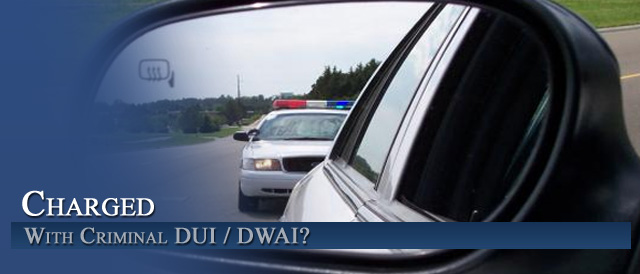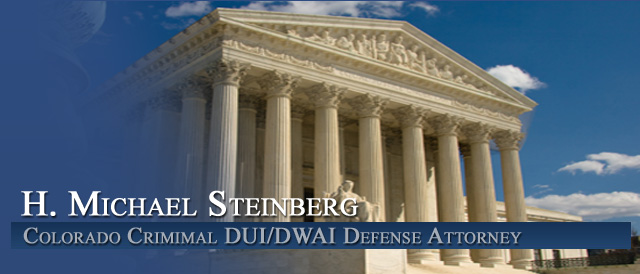




Federal DUI Cases In Colorado
by Colorado Federal DUI Defense Lawyer – Attorney H. Michael Steinberg
Federal DUI’s occur in Colorado when the DUI – DWAI as a criminal charge happens on federal property of some kind. All 50 states – and especially Colorado – have multiple areas that are under federal jurisdiction. If you are arrested for drunk driving – DUI – on federal land you will be charged with a “Federal DUI.” Colorado DUI laws and penalties are combined with federal law in these cases.
Defending Against A Federal DUI In Colorado – Knowing Federal Law
If you are arrested for a “Federal DUI,” in Colorado – your lawyer must be well versed and experienced with Federal DUI laws.
Federally Owned Land In Colorado and DUI Cases
An arrest that is made on federally-owned or controlled land must be prosecuted under federal court. Federal DUI charges are prosecuted in the U.S. District Court for the District of Colorado in downtown Denver.
BUT – What Laws Apply Depends On The Nature Of The Federal Land Involved
It is confusing – there are two types of federal DUI offenses, those committed on lands managed by the National Park Service and those committed on other lands such as military bases.
If the federal land is not under the National Park Service the prevailing state law is applied and – as discussed below – if the offense is committed on a military base or similar institution, additional penalties may apply.
Federal DUIs in Colorado’s National Parks
Federal DUI offenses occurring in national parks are governed by the Code of Federal Regulations (CFR). If you are caught driving under the influence of alcohol while you are camping on land owned by the National Park Service, – you could face driver’s license suspension, up to $5,000 in fines, and up to six months in jail a Class B Misdemeanor
Accordingly, a person can be charged with DUI if:
He/she is under the influence of alcohol, drugs, or any combination thereof to render the operator incapable of safe operation;
OR
If the alcohol concentration in the operator’s blood or breath is – .10 grams or more of alcohol per 100 milliliters of blood, or .10 grams or more of alcohol per 210 liters of breath;
OR
The BAC limit established pursuant to state law is more restrictive than the above standards. (In Colorado – it is!) Under Colorado law, followed in federal DUI cases, it is presumed that a driver is under the influence of alcohol if the driver’s blood alcohol measurement is .08 grams or more of alcohol per 100 milliliters of blood or grams of alcohol per 210 liters of breath.
Under the Code of Federal Regulations, an arrest for drunk driving (DUI) in a national park is a Class B misdemeanor. Therefore, a person charged with a DUI in a national park can be punished up to six months in a federal prison, a fine of up to $5,000 and a maximum of five years of probation.
Examples of National Parks in Colorado on which a drunk driver may be arrested for a Federal DUI , are:
Colorado National Parks such as Black Canyon of the Gunnison National Park near Montrose,
Great Sand Dunes National Park and Preserve near Mosca,
Mesa Verde National Park and UNESCO World Heritage Site near Cortez,
Rocky Mountain National Park near Estes Park and Grand Lake
Federal DUIs in Colorado’s Military Bases, Federal Property, and Other Federal Facilities
If you are charged with DUI – DWAI on other these types of federal land – the laws are different. Under these circumstances – you come under a federal law known as the Assimilative Crimes Act, located at 18 U.S.C. � 13.
Here Is The Assimilative Crimes Act
United States Code Title 18, section 13 is called the Assimilative Crimes Act and provides that the Laws of Colorado will be adopted for areas within Federal jurisdiction other than National Parks.
Section 13 provides:
(a) Whoever within or upon any of the places now existing or hereafter reserved or acquired as provided in section 7 of this title, or on, above, or below any portion of the territorial sea of the United States not within the jurisdiction of any State, Commonwealth, territory, possession, or district is guilty of any act or omission which, although not made punishable by any enactment of Congress, would be punishable if committed or omitted within the jurisdiction of the State, Territory, Possession, or District in which such place is situated, by the laws thereof in force at the time of such act or omission, shall be guilty of a like offense and subject to a like punishment.
(b)(1) Subject to paragraph (2) and for purposes of subsection (a) of this section, that which may or shall be imposed through judicial or administrative action under the law of a State, territory, possession, or district, for a conviction for operating a motor vehicle under the influence of a drug or alcohol, shall be considered to be a punishment provided by that law. Any limitation on the right or privilege to operate a motor vehicle imposed under this subsection shall apply only to the special maritime and territorial jurisdiction of the United States.
(2)(A) In addition to any term of imprisonment provided for operating a motor vehicle under the influence of a drug or alcohol imposed under the law of a State, territory, possession, or district, the punishment for such an offense under this section shall include an additional term of imprisonment of not more than 1 year, or if serious bodily injury of a minor is caused, not more than 5 years, or if death of a minor is caused, not more than 10 years, and an additional fine under this title, or both, if—
(i) a minor (other than the offender) was present in the motor vehicle when the offense was committed; and
(ii) the law of the State, territory, possession, or district in which the offense occurred does not provide an additional term of imprisonment under the circumstances described in clause (i).
(B) For the purposes of subparagraph (A), the term “minor” means a person less than 18 years of age.
(c) Whenever any waters of the territorial sea of the United States lie outside the territory of any State, Commonwealth, territory, possession, or district, such waters (including the airspace above and the seabed and subsoil below, and artificial islands and fixed structures erected thereon) shall be deemed, for purposes of subsection (a), to lie within the area of the State, Commonwealth, territory, possession, or district that it would lie within if the boundaries of such State, Commonwealth, territory, possession, or district were extended seaward to the outer limit of the territorial sea of the United States.
Colorado’s Military Bases and DUI Charges
Colorado has some of the finest military bases in the world – among them the Colorado Springs Air Force Academy, Buckley Air Force Base, Cheyenne Mountain, Peterson Air Force Base and Fort Carson Army Base.
Basically – an arrest for a DUI on federal land – such as a military base – is prosecuted using the laws of the state where the DUI occurred – in this case Colorado of course. However, unlike other Colorado Driving Under the Influence (DUI) or Driving While Impaired (DWAI) cases, which are prosecuted in Colorado’s County Courts, these cases take place on in Federal Court – the U.S. District Court for the District of Colorado.
Federal DUI Cases In Colorado – Your Lawyer Must Have The Right Kind Of Experience
It is a very different kind of prosecution and your attorney must have experience in defending federal drunk driving cases to help you understand and explain the difference between state and federal prosecutions, and the potential penalties of each. Under Federal Law – in National Parks – remove the right to a jury for Driving Under the Influence I (first offense). Furthermore – bail is an issue and the federal pretrial services program has a right to incarcerate you while the case is making its way through federal court.
In addition – the laws that govern deadlines and the requirements for filing motions with the court are different. If deadlines are missed or guidelines for court filings are not followed precisely, the case is damaged. All of this – again – making it critical that an attorney have experience in handling a federal case and understand the federal process.
Also a conviction here – is recorded on your federal criminal history with no possibility for expungement unless you are pardoned by the President of the United States. This DUI – appearing on your federal criminal record – can prevent you from obtaining security clearance and may prevent you from certain job opportunities.
Federal DUI cases are handled in federal courts and these are bench ( or judge only ) trials with no jury.
Federal Penalty Enhancements For DUI – Vehicular Assault and Vehicular Homicide
If you are convicted of DUI in federal court, you face up to 1 year and up to $1,000 fine with no aggravating factors pursuant to Colorado’s Title 42. BUT if aggravating factors exist – a minor in the vehicle – or serious injury or death to another as a result of the DUI, federal law applies and the punishment may greatly exceed the Colorado state version of these offenses.
Consequences In Federal Court For Refusal To Take The Blood Alcohol Test – A Separate Charge
If you are under a arrest for a “federal DUI” – you will be asked to submit to a chemical test.
Pursuant to the Implied Consent Law, you must submit to a blood, breath alcohol or urine test. You may refuse – of course – to take the chemical test; however, refusal to take the chemical test can lead to loss of driving privileges on federal land for up to one year.
Also – if you refuse to take the test – this may result in a misdemeanor charge, and may carry additional monetary fines, prison sentences, and denial of driving privileges on federal land.
A refusal to submit to a chemical test is a misdemeanor in accordance with the CFR. A person who refused a chemical test during an arrest in a national park faces additional fines and potential incarceration in Federal prison and, if convicted, a person who refused a chemical test can be denied the driving privilege on federal lands for one year.
In addition the federal authorities notify the Colorado DMV of a chemical test refusal conviction. The DMV then imposes a license revocation in the same manner it does in a Colorado State violation of the Express Consent Law.
Federal DUI Probation – Stricter – Tougher
Federal DUI probation may also be far more strict than comparable Colorado state law when it comes to probation. The probation for a DUI in federal court is formal, rather than informal. That means that you have to report to a probation officer, answer much more personal questions about your life-especially alcohol and drug usage-subject your house searched, and physically and often have to report to the probation officer on a regular basis. You may also be unable to leave the country (or even the state) without permission from the court and/or the probation officer.
Please call our law firm if you have questions about ..
Federal DUI Cases In Colorado
H. Michael Steinberg has been a Colorado criminal law specialist attorney for 40 years (as of 2012). For the First 13 years of his career, he was an Arapahoe – Douglas County District Attorney Senior prosecutor. In 1999 he formed his own law firm for the defense of Colorado criminal cases.
In addition to handling tens of thousands of cases in the trial courts of Colorado, he has written hundreds of articles regarding the practice of Colorado criminal law and frequently provides legal analysis on radio and television, appearing on the Fox News Channel, CNN and Various National and Local Newspapers and Radio Stations. Please call him at your convenience at 720-220-2277.
If you have questions about Federal DUI Cases In Colorado in the Denver metropolitan area and throughout Colorado, attorney H. Michael Steinberg will be pleased to answer those questions and to provides quality legal representation to those charged in Colorado adult and juvenile criminal matters.
In the Denver metropolitan area and throughout Colorado, attorney H. Michael Steinberg provides quality legal representation to those charged in Colorado adult and juvenile criminal matters…as regards Federal DUI Cases In Colorado.
Other Articles of Interest:
- Colorado DUI – DWAI Refusals – Defense Tactics – The Decision to Refuse To Blow – Breathalyzer and Blood Test
- Colorado Criminal Law – Q and A – Colorado Texting And Driving Law – C.R.S. 42-4-239 – UPDATED 2017
- Colorado Criminal Law – Am I Safe To Sit In My Car – Police Intrusion Issues
- Understanding The Elusive Wet Reckless Plea Bargain In Colorado DUI Cases
- Attacking Your Colorado DUI – DWAI Case – Common Tactical Approaches













